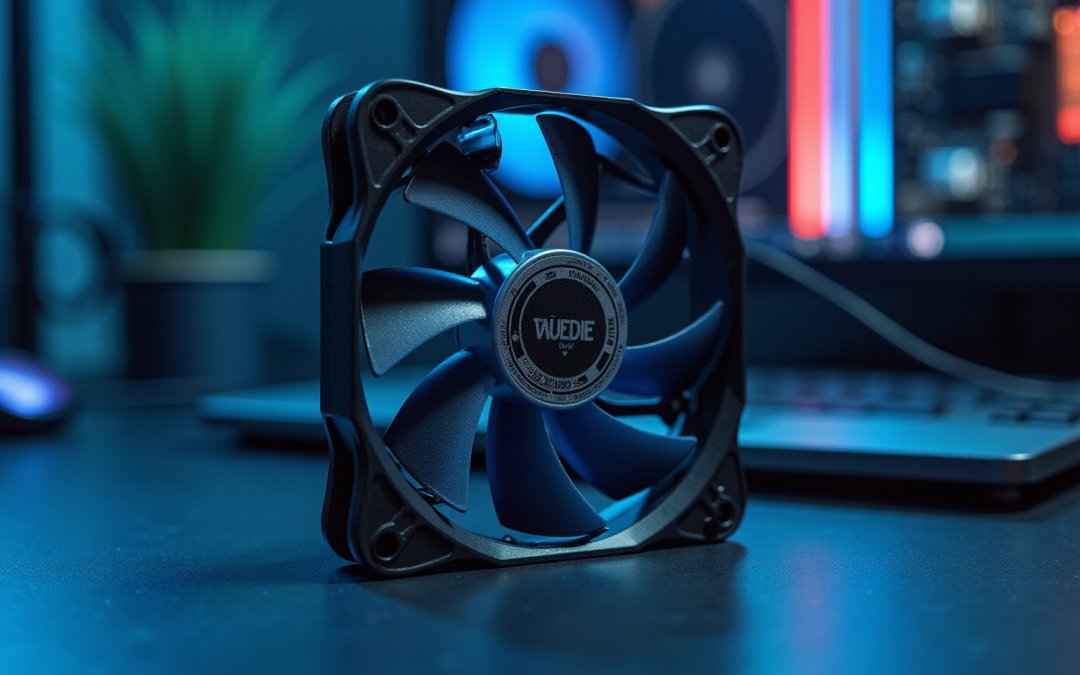Overview
This article delves into the critical role and characteristics of 40mm PC fans in the thermal management of electronic devices. These compact fans are indispensable for achieving efficient cooling, crucially preventing overheating and prolonging the lifespan of electronic components. Supported by technological advancements that enhance their efficiency and reduce noise levels, these fans are increasingly suitable for a diverse range of applications, from mini PCs to industrial systems. Understanding their significance is essential for anyone involved in electronic design and maintenance.
Introduction
In the realm of electronics, the compact yet powerful 40mm PC fan is pivotal, as effective thermal management is essential for ensuring device reliability and performance. These small fans not only optimize airflow to prevent overheating but also significantly extend the lifespan of critical components, particularly in space-constrained environments.
However, as technology evolves, engineers face a pressing challenge: how to select the right fan from a vast array of options, each presenting unique features and specifications. This article explores the essential characteristics, historical evolution, and significance of 40mm PC fans, illuminating their indispensable role in contemporary electronics cooling solutions.
Define the 40mm PC Fan: Specifications and Functionality
A 40mm PC fan serves as a compact solution for temperature management, expertly designed to efficiently disperse heat from electronic components, thereby enhancing performance and extending lifespan. With , these devices come in various thicknesses, typically 10 millimeters or 20 millimeters, and operate at standard voltage levels of 5V and 12V. The primary function of a 40mm PC fan is to generate airflow, measured in cubic feet per minute (CFM), which is essential for regulating the temperatures of critical components like CPUs, GPUs, and other heat-sensitive devices. This airflow is indispensable in preventing overheating and ensuring system stability, particularly in compact builds where space constraints are prevalent.
Gagner-Toomey Associates distinguishes itself as a premier supplier of innovative temperature control solutions, offering a broad array of DC input units, including models engineered for effectiveness, efficiency, and minimal noise. Recent advancements in 40mm PC fan technology have concentrated on optimizing efficiency and minimizing noise levels. For instance, Gagner-Toomey Associates’ supporters are recognized for their ability to maintain exceptional cooling efficiency while operating quietly, with noise levels often below 18 dB. These devices can achieve airflow rates of up to 5.5 CFM, making them ideal for applications ranging from mini PCs to industrial controllers.
Case studies illustrate the practical applications of 40mm PC fans. Users have successfully integrated PWM-controlled ventilation units into compact devices such as R2-D2 droids, facilitating temperature-dependent speed adjustments and complete shutdown when idle. This functionality not only boosts cooling efficiency but also enhances the longevity of components by averting excessive heat accumulation.
Furthermore, Gagner-Toomey Associates’ supporters can be equipped with IP protection upon request, ensuring reliability across various environments. The expected lifespan of these devices surpasses 150,000 hours under typical conditions, underscoring their dependability and durability. Additionally, it is essential to consider static pressure in fan operation, as elevated static pressure can result in diminished airflow output, rendering it a pivotal factor in fan selection.
In conclusion, the importance of airflow in cooling devices cannot be overstated, as it directly influences the efficiency and reliability of electronic systems. As technology continues to advance, the demand for compact and efficient thermal management solutions is poised to grow, positioning the 40mm PC fan units from Gagner-Toomey Associates as a vital component in modern electronics.
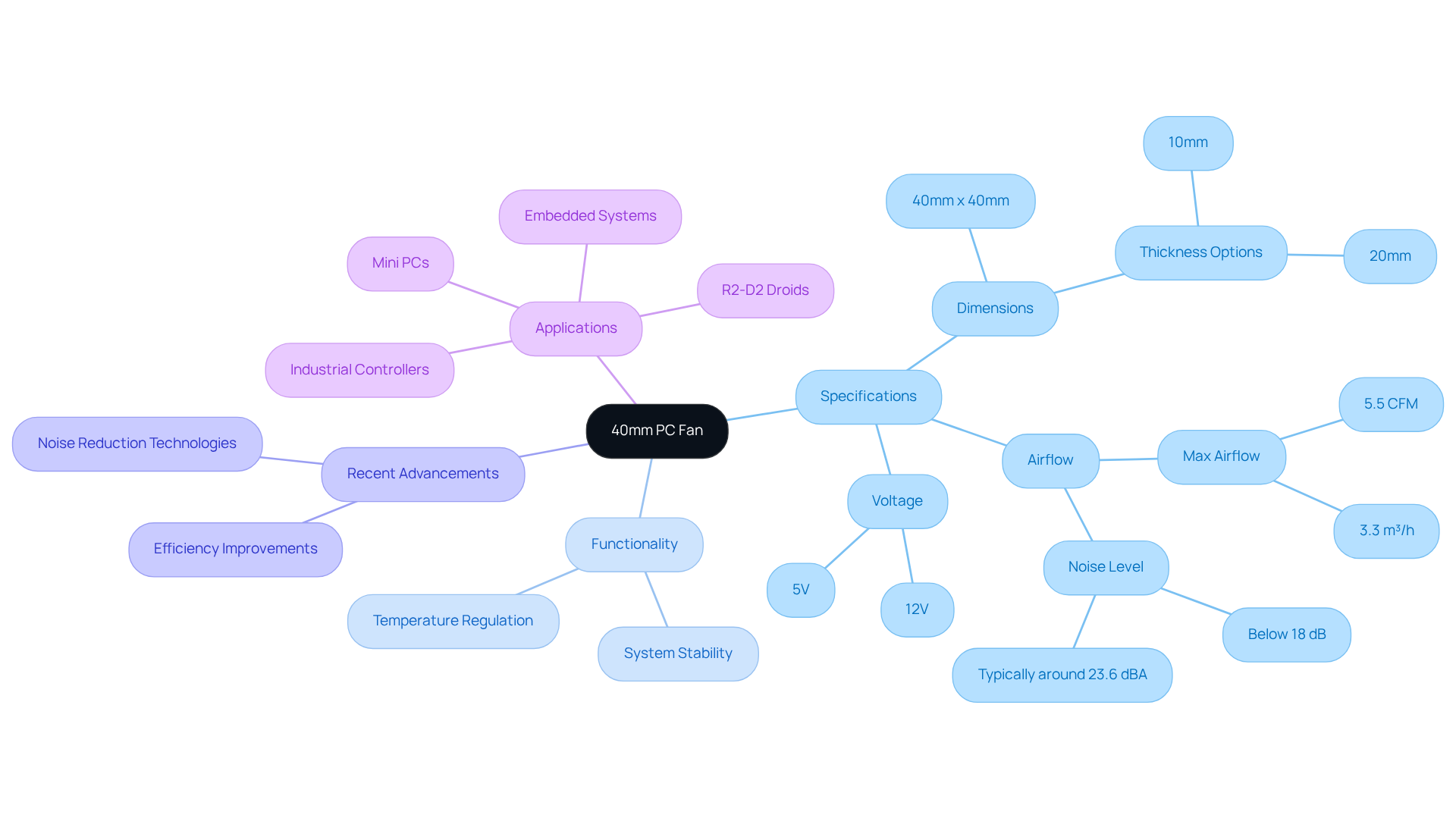
Contextualize the Role of 40mm Fans in Electronics Cooling
In the electronics industry, effective thermal management is not merely beneficial; it is crucial for ensuring the reliability and performance of devices. The role of the 40mm pc fan emerges as essential within thermal management solutions, particularly for compact devices such as laptops, routers, and embedded systems. Their compact size enables them to fit into narrow spaces where larger units are impractical, making them ideal for applications that demand without sacrificing design integrity. By enhancing airflow, these devices effectively disperse heat generated by electronic components, preventing thermal throttling and potential damage.
The integration of 40mm pc fans is vital for maintaining optimal operating temperatures, especially in high-performance computing environments where the risk of overheating is significant. As Gagner-Toomey Associates notes, “Temperature regulation is essential for the functionality and reliability of electronic devices because overheating can result in reduced efficiency, component failure, and disastrous incidents like fires, significantly shortening the lifespan of devices.”
Furthermore, the market for compact ventilators is projected to expand at a CAGR of approximately 2.9%, reflecting the increasing power densities in electronics and underscoring the importance of these temperature regulation solutions in preserving device lifespan and efficiency. Additionally, the implementation of thermal interface materials (TIMs) is critical for facilitating effective heat transfer between components and heat sinks, thereby further enhancing thermal management in electronic devices.
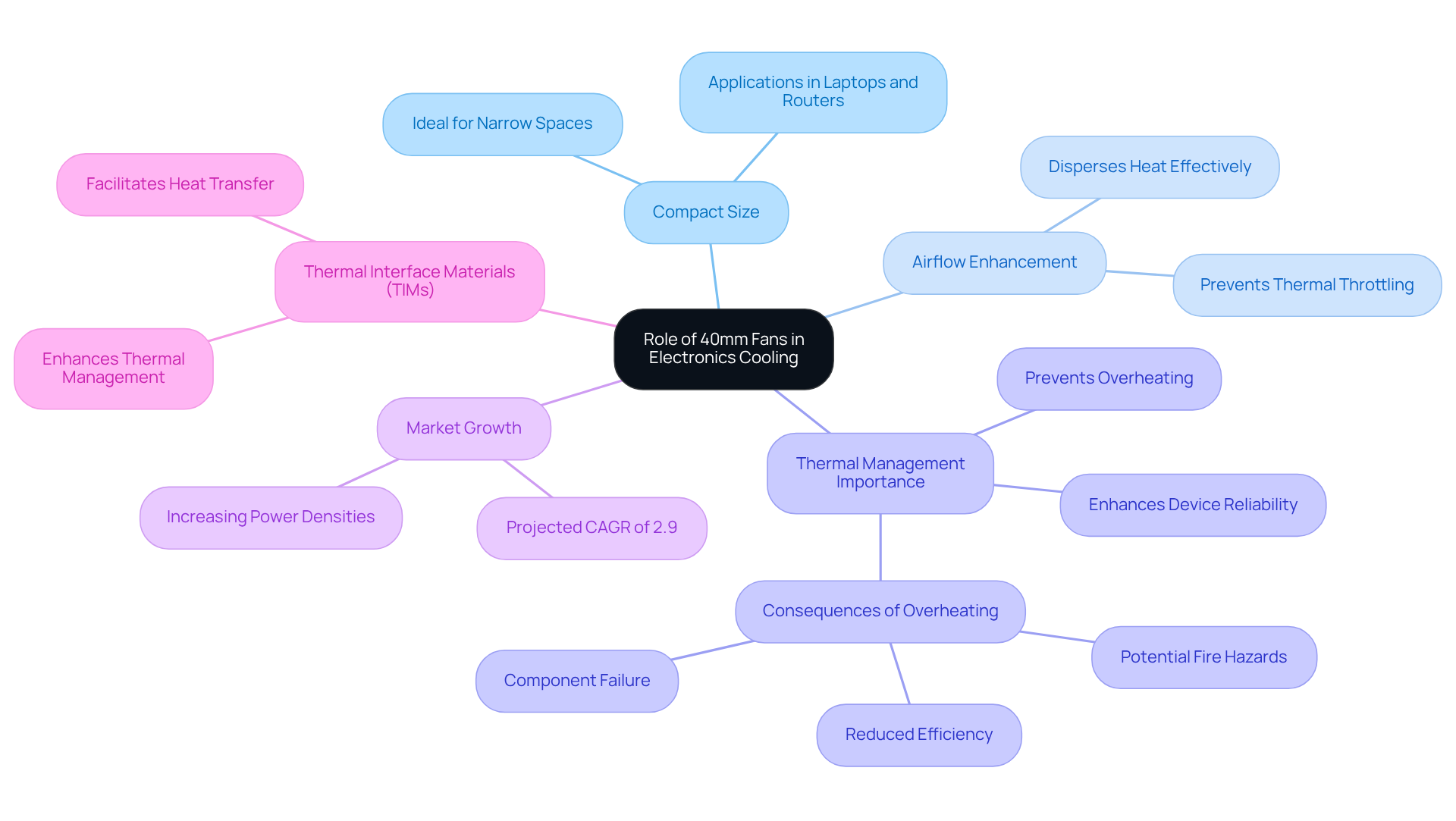
Trace the Evolution of 40mm PC Fans: Historical Insights and Innovations
The development of 40mm PC fans can be traced back to the early days of personal computing, a time when temperature management solutions primarily focused on larger systems. As technology advanced and devices became more compact, there emerged a pressing demand for smaller, efficient temperature regulation solutions. Innovations such as brushless DC motors and advanced blade designs have significantly enhanced the efficiency and noise levels of these compact cooling devices.
Furthermore, manufacturers have introduced features like PWM (Pulse Width Modulation) control, which enables dynamic speed adjustments based on thermal demands. Today, the use of the 40mm PC fan is indispensable across a variety of applications, from gaming consoles to industrial machinery, underscoring the ongoing necessity for in increasingly compact designs.
Additionally, advancements in miniaturization technology and the influence of companies like RIGID in shaping the future of miniature temperature regulation systems emphasize the critical importance of these fans in modern electronics. Industry experts highlight that the integration of AI and ML technologies is paving the way for smarter climate control solutions, thereby enhancing efficiency and performance across diverse applications.
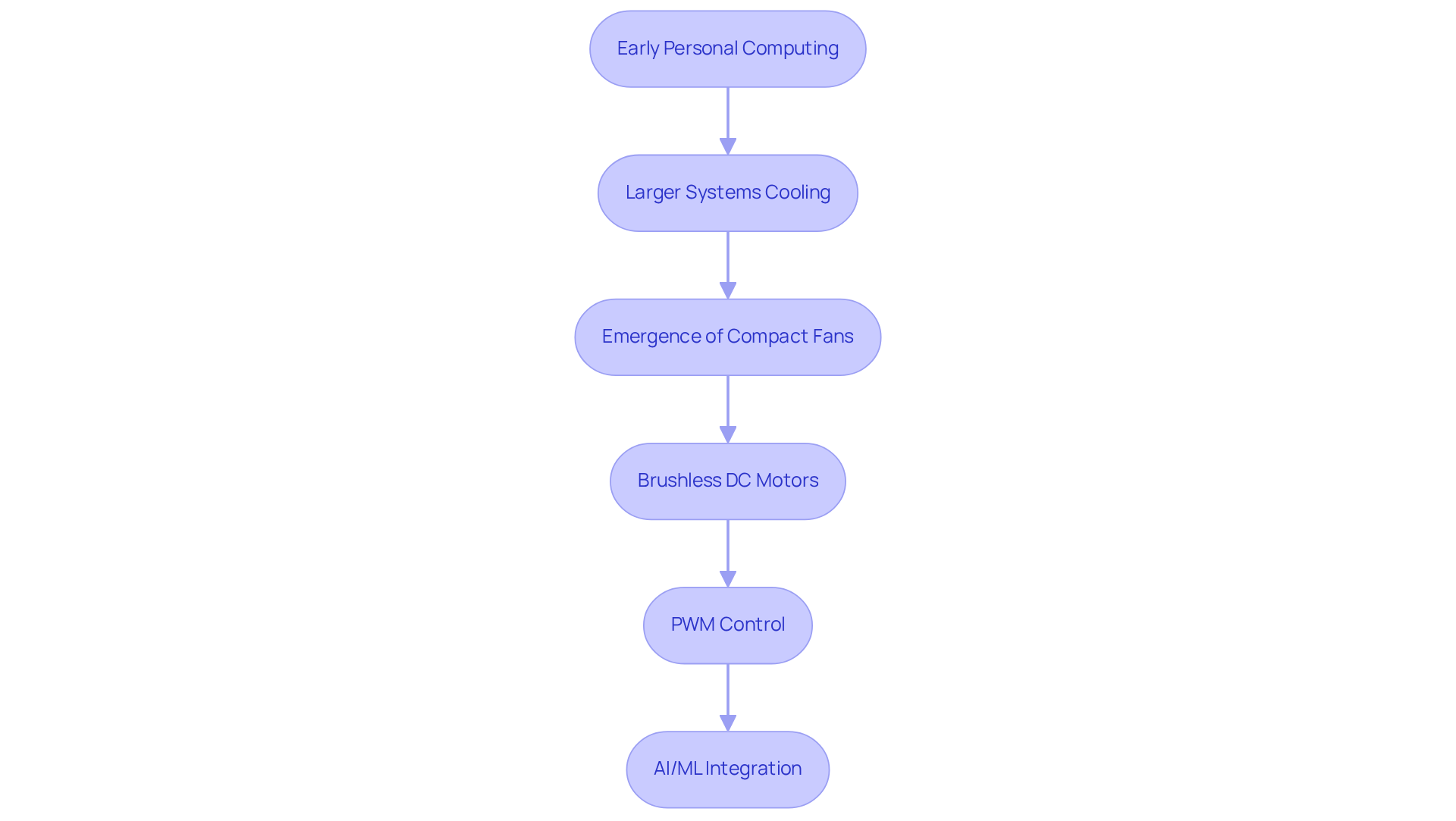
Identify Key Characteristics and Features of 40mm PC Fans
Selecting the right PC fan of the specified size necessitates a thorough evaluation of several key features. Airflow, measured in cubic feet per minute (CFM), is a critical factor that affects a fan’s ability to effectively reduce temperature. For instance, Noctua’s cooling units are meticulously designed to provide adequate airflow while maintaining a compact form factor, making them suitable for a range of applications, including mini PCs and networking devices. As noted by Noctua, ‘For those needing quiet, effective cooling in limited areas, investing in a 40mm pc fan from Noctua is a wise choice.’ Furthermore, noise levels, typically quantified in decibels (dBA), are also of paramount importance, especially in settings where silent operation is essential. Many users report that Noctua fans operate at a noise level of approximately 23.6 dBA, ensuring a serene computing experience.
The type of bearing utilized in the fan significantly impacts its longevity and performance. Sleeve bearings, ball bearings, and fluid dynamic bearings each present unique benefits, with fluid bearings generally offering quieter operation and extended lifespans, often surpassing 100,000 hours under standard conditions. This durability is a vital consideration for engineers in search of . Moreover, features such as PWM control facilitate adjustable speeds, optimizing efficiency and minimizing noise during periods of low demand.
Aesthetic factors, including LED lighting options, can also affect fan selection, particularly in custom builds where visual appeal is a priority. Additionally, integrating dust filters can greatly enhance the fan’s durability by inhibiting debris accumulation. However, it is essential to recognize that the airflow of smaller fans may not match that of larger models, suggesting that in certain applications, they may face limitations. By comprehensively understanding these essential characteristics, engineers can make informed choices when selecting a fan that aligns with their specific cooling needs. Pricing for the 40mm pc fan from Noctua typically falls between $12 and $20, a crucial aspect for budget-conscious engineers.
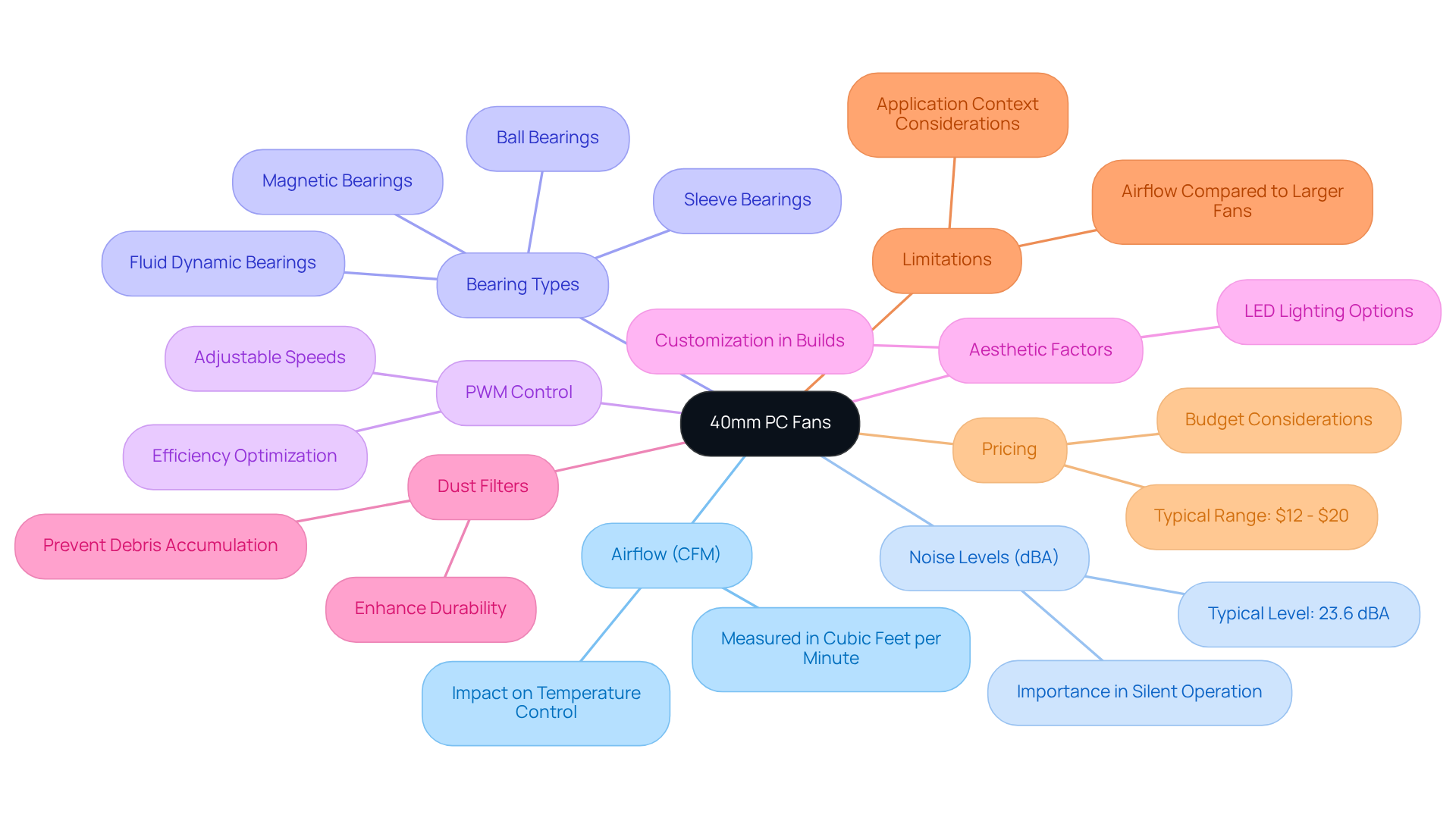
Conclusion
The significance of 40mm PC fans in modern electronics is paramount. These compact cooling solutions are essential for maintaining optimal temperatures within devices, thereby ensuring reliability and performance. Their capacity to efficiently manage airflow in confined spaces renders them indispensable across a spectrum of applications, from personal computers to industrial machinery.
This article has illuminated key insights into the specifications, functionality, and evolution of 40mm PC fans. These fans not only prevent overheating but also enhance the longevity of critical components. Technological advancements, such as PWM control and innovative bearing designs, have markedly improved their efficiency and minimized noise levels, making them suitable for diverse environments. Moreover, the anticipated growth of the compact fan market highlights the escalating demand for effective thermal management solutions.
As technology advances, the necessity for reliable and efficient cooling systems will only intensify. Selecting the appropriate 40mm PC fan—considering factors such as airflow, noise levels, and durability—is vital for engineers and designers seeking to optimize device performance. Embracing these compact cooling solutions transcends mere preference; it is a crucial step toward ensuring the longevity and efficiency of electronic devices in an ever-evolving technological landscape.
Frequently Asked Questions
What is a 40mm PC fan and what are its main specifications?
A 40mm PC fan is a compact cooling solution designed to manage temperature in electronic components. It has standard dimensions of 40mm by 40mm and comes in various thicknesses, typically 10mm or 20mm. These fans operate at standard voltage levels of 5V and 12V.
What is the primary function of a 40mm PC fan?
The primary function of a 40mm PC fan is to generate airflow, measured in cubic feet per minute (CFM), which is essential for regulating the temperatures of critical components like CPUs and GPUs, preventing overheating, and ensuring system stability.
How does Gagner-Toomey Associates differentiate its 40mm PC fans from others?
Gagner-Toomey Associates offers innovative temperature control solutions with a focus on effectiveness, efficiency, and minimal noise. Their fans are recognized for maintaining exceptional cooling efficiency while operating quietly, with noise levels often below 18 dB.
What is the maximum airflow rate of a 40mm PC fan from Gagner-Toomey Associates?
The 40mm PC fans can achieve airflow rates of up to 5.5 CFM, making them suitable for applications ranging from mini PCs to industrial controllers.
Can 40mm PC fans be used in specialized applications?
Yes, 40mm PC fans can be integrated into compact devices, such as R2-D2 droids, allowing for PWM-controlled ventilation that adjusts speed based on temperature and can shut down completely when idle.
What is the expected lifespan of a 40mm PC fan?
The expected lifespan of a 40mm PC fan is over 150,000 hours under typical conditions, indicating their reliability and durability.
Is it possible to enhance the reliability of 40mm PC fans for different environments?
Yes, Gagner-Toomey Associates’ fans can be equipped with IP protection upon request, ensuring reliability across various environments.
Why is static pressure important in fan operation?
Elevated static pressure can result in diminished airflow output, making it a crucial factor to consider when selecting a fan for optimal performance.
What is the significance of airflow in cooling devices?
Airflow is critical in cooling devices as it directly influences the efficiency and reliability of electronic systems, helping to prevent overheating and ensuring stable operation.

